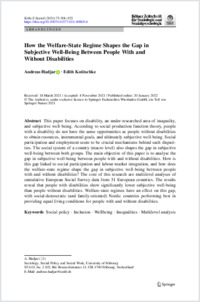How the Welfare-State Regime Shapes the Gap in Subjective Well-Being Between People With and Without Disabilities
BP2-STS
- Hadjar, Andreas ORCID University of Fribourg
- Kotitschke, Edith District Council of Göttingen
- 2021
Published in:
- Kölner Zeitschrift für Soziologie und Sozialpsychologie (KZfSS). - Springer Science and Business Media LLC. - 2021, vol. 73, no. 4, p. 501-525
Sociology and Political Science
Social Psychology
Social policy
Inclusion
Wellbeing
Inequalities
Multilevel analysis
English
This paper focuses on disability, an under-researched area of inequality, and subjective well-being. According to social production function theory, people with a disability do not have the same opportunities as people without disabilities to obtain resources, instrumental goals, and ultimately subjective well-being. Social participation and employment seem to be crucial mechanisms behind such disparities. The social system of a country (macro level) also shapes the gap in subjective well-being between both groups. The main objective of this paper is to analyse the gap in subjective well-being between people with and without disabilities. How is this gap linked to social participation and labour market integration, and how does the welfare-state regime shape the gap in subjective well-being between people with and without disabilities? The core of this research are multilevel analyses of cumulative European Social Survey data from 31 European countries. The results reveal that people with disabilities show significantly lower subjective well-being than people without disabilities. Welfare-state regimes have an effect on this gap, with social-democratic (and family oriented) Nordic countries performing best in providing equal living conditions for people with and without disabilities.
- Faculty
- Faculté des lettres et des sciences humaines
- Department
- Département des sciences sociales
- Language
-
- English
- Classification
- Social sciences
- License
-
Rights reserved
- Open access status
- bronze
- Identifiers
-
- DOI 10.1007/s11577-021-00805-4
- ISSN 0023-2653
- Persistent URL
- https://folia.unifr.ch/unifr/documents/320293
Statistics
Document views: 111
File downloads:
- 2021_hadjar_how: 192
